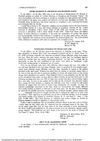 September 1961 in “Archives of Dermatology”
September 1961 in “Archives of Dermatology” Colchicine causes hair loss by damaging hair follicles.
January 1959 in “Acta medica Scandinavica” A balanced diet with essential vitamins, especially B-complex, prevents hair loss.
April 2023 in “Journal of Investigative Dermatology” Autologous cell-based therapy using dermal sheath cup cells may help treat pattern hair loss, especially in women.
April 2023 in “Medizinische Genetik” Male-pattern hair loss is largely influenced by genetics, with key genes identified.
January 2023 in “Journal of Cosmetic Dermatology” Alopecia areata gained more interest on social media than pattern hair loss, with TikTok showing more personal stories and YouTube offering higher quality educational content.
January 2023 in “Handbook of Skin Disease Management” Treat male pattern hair loss by checking B12, folate, thyroid levels, and using step-by-step treatments.
October 2022 in “International Journal of Research in Dermatology” Hormonal imbalances contribute to female hair loss, and trichoscopy is a useful diagnostic tool.
September 2022 in “International Journal of Trichology” Trichoscopic measurements help determine the severity of female pattern hair loss.
July 2022 in “Journal of Investigative Dermatology” Scalp clarifying shampoo can help reduce hair loss and improve hair volume.
June 2022 in “Our Dermatology Online” Trichoscopy is essential for early detection and monitoring of female-pattern hair loss.
 June 2022 in “Journal of Dermatology Research”
June 2022 in “Journal of Dermatology Research” Using 448-kHz Capacitive-Resistive Electrothermal Therapy can help increase hair density and prevent hair loss in women.
June 2022 in “Plastic and reconstructive surgery. Global open” PRP treatment for hair loss improves quality of life and emotional well-being.
 February 2022 in “International Journal of Research in Dermatology”
February 2022 in “International Journal of Research in Dermatology” Topical minoxidil is the primary treatment for female pattern hair loss in India.
 February 2022 in “Chinese Journal of Dermatology”
February 2022 in “Chinese Journal of Dermatology” A 36-year-old woman with worsening hair loss over 10 years was treated with various medications, and after six months, her hair loss did not worsen significantly.
January 2022 in “Indian Dermatology Online Journal” Oral minoxidil is a safe and effective treatment for patterned hair loss.
December 2021 in “Journal of pharmaceutical research international” Trichoscopic features can help dermatologists distinguish between female pattern hair loss and chronic telogen effluvium.
December 2021 in “IP Indian journal of clinical and experimental dermatology” Trichoscopy is a useful tool for diagnosing female pattern hair loss.
October 2021 in “DOAJ (DOAJ: Directory of Open Access Journals)” Trichoscopy effectively distinguishes between severe and mild male pattern hair loss.
October 2021 in “QJM: An International Journal of Medicine” ADSC injections improve hair density, thickness, and reduce inflammation in female pattern hair loss.
 October 2021 in “Journal of Investigative Dermatology”
October 2021 in “Journal of Investigative Dermatology” Poor blood supply in hair follicles is linked to nutrient deficiency in patients with female pattern hair loss, and adding more nutrients could potentially fix this.
August 2021 in “Journal of The American Academy of Dermatology” Newer contraceptives with less androgenic progestins may reduce female hair loss.
January 2021 in “Hair transplant forum international” Microneedling may help hair growth, but its pain and mixed results make its effectiveness unclear.
 December 2020 in “Journal of The American Academy of Dermatology”
December 2020 in “Journal of The American Academy of Dermatology” Artificial intelligence can accurately predict hair growth and treatment results in female pattern hair loss patients, with age of onset and duration being key factors.
December 2020 in “Journal of Skin and Sexually Transmitted Diseases” No strong link between testosterone or DHEAS levels and acne or hair loss in females.
 September 2020 in “International journal of computer science and mobile computing”
September 2020 in “International journal of computer science and mobile computing” Low-level laser therapy can stimulate hair growth and increase hair density, making it a promising treatment for hair loss.

PRP therapy with Derma roller effectively promotes hair re-growth and reduces hair fall in women with pattern hair loss.
January 2020 in “Journal of clinical and cosmetic dermatology” A woman with hair loss regrew hair using minoxidil and spironolactone.
 April 2019 in “Journal of Investigative Dermatology”
April 2019 in “Journal of Investigative Dermatology” Low-level laser therapy helps hair growth and reduces hair loss with few side effects.
 April 2019 in “Journal of emerging technologies and innovative research”
April 2019 in “Journal of emerging technologies and innovative research” Early treatment of Female Pattern Hair Loss is important to stop it from getting worse, and various treatments can help, especially in mild to moderate cases.
Mesotherapy is more effective and preferred for female hair loss than topical minoxidil.










